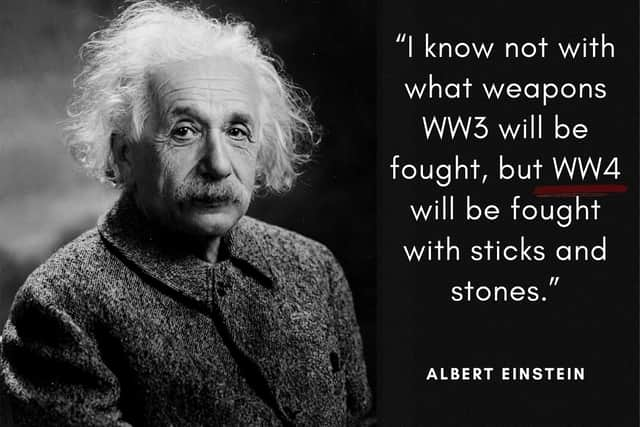Doomsday Clock: What is it, how close is it to midnight, and what time have scientists set it to in 2023?
and live on Freeview channel 276
First published in 1947, interest in the Doomsday Clock appreciated following the cold war but now it’s closer to midnight than ever before. The Bulletin of the Atomic Scientists has gathered yet again and the public waits to see if the clock face will turn toward danger or redemption.
It’s no surprise to hear the global forecast for 2023 is fairly tense. After emerging from the prodigious challenges of COVID-19, the western world now anxiously awaits the outcome of the Russo-Ukrainian war. While elsewhere, anti-regime protests in Iran continue and eyes are on Beijing where Taiwan ponder China’s ambiguous strategy and capability to invade.
Advertisement
Advertisement
The feeling of uncertainty is emboldened by a climate crisis bubbling under the surface which many fear could spill over if leaders are occupied elsewhere. However, against all expectations the clock hasn’t budged since 2020 and there is belief the pendulum could swing back with the recent dethroning of Donald Trump.
But what is the Doomsday Clock, what is the current time on the clock and when will scientists decide to measure this year’s time?
What is the Doomsday Clock?
In its simplest form, the Doomsday Clock is a symbol representing how close the world is to a global catastrophe from that of our own making. On the metaphorical clock, the closer to midnight the time is set to midnight - the closer scientists believe we are to ultimate damnation.
The Doomsday Clock was created in 1947 by the Bulletin of the Atomic Scientists - a group formed by professionals at the University of Chicago who contributed to the creation of the atomic bomb. Toward the end of the 2000s, scientists started factoring in the consequences of climate change.
Advertisement
Advertisement
In 1939, President Franklin Roosevelt received a letter of warning from Leo Szilard and Albert Einstein about the potential creation of an overwhelmingly destructive bomb - known now as the atomic bomb. The scientists proposed that the U.S could create such a device and use it to threaten Japan amid World War II but strongly argued against the physical use of the weapon.
When members of the Manhattan Project scientists learned the weapon had been used on Hiroshima, they created the Bulletin of the Atomic Scientists with the aim of informing the public surrounding the dangers of science in political conflict. Eventually, Martyl Langsdorf illustrated a minimalist clock that could communicate this best to the public.


Contributing factors to the clock’s mobility include climate change, nuclear proliferation and “disruptive technologies,including bio- and cybersecurity.” Members of the Bulletin maintain the clock is for informational purposes and to inspire action rather than create fear.
What is the current time on the Doomsday Clock?
The current time on the Doomsday Clock registers 100 seconds till midnight. The closest the clock has ever been to the fateful hour.
Advertisement
Advertisement
However, the clock has twice been set to the two minute mark. Once in 1953, amid tensions of the cold war between the Soviet Union & the U.S and again in 2018 following the election of Donald Trump and a “a breakdown in the international order”.


When the Soviet Union fell in 1991, the world let out a sigh of relief and this was reflected in the clock’s placement - a record 17 minutes to midnight.
When will the Doomsday Clock be set in 2023?
The Bulletin of the Atomic Scientists has decided to turn the clock 10 seconds toward midnight. The Doomsday Clock now stands at 90 seconds to midnight.
Announcing the shocking news on its Youtube account, members of the Bulletin noted that Putin’s potential use of nuclear weapons inspired the decision. The Bulletin also pointed toward Iran’s interest in expanding its amount of enriched uranium as another factor.
Advertisement
Advertisement
They conclude the risk of nuclear catastrophe is higher today.
How has the Doomsday Clock changed over the years?
- 1947 – 48: 7 minutes
- 1949 – 52: 3 minutes
- 1953 – 59: 2 minutes
- 1960 – 62: 7 minutes
- 1963 – 67: 12 minutes
- 1968: 7 minutes
- 1969 – 71: 10 minutes
- 1972 – 73: 12 minutes
- 1974 – 79: 9 minutes
- 1980: 7 minutes
- 1981 – 83: 4 minutes
- 1984 – 87: 3 minutes
- 1988 – 89: 6 minutes
- 1990: 10 minutes
- 1991 – 94: 17 minutes
- 1995 – 97: 14 minutes
- 1998 – 2001: 9 minutes
- 2002 – 06: 7 minutes
- 2007 – 09: 5 minutes
- 2010 – 11: 6 minutes
- 2012 – 14: 5 minutes
- 2015 – 16: 3 minutes
- 2017 – 2.5 minutes
- 2018 – 2 minutes
- 2019 – 2 minutes
- 2020 – 100 seconds
- 2021 – 100 seconds
- 2022 – 90 seconds
